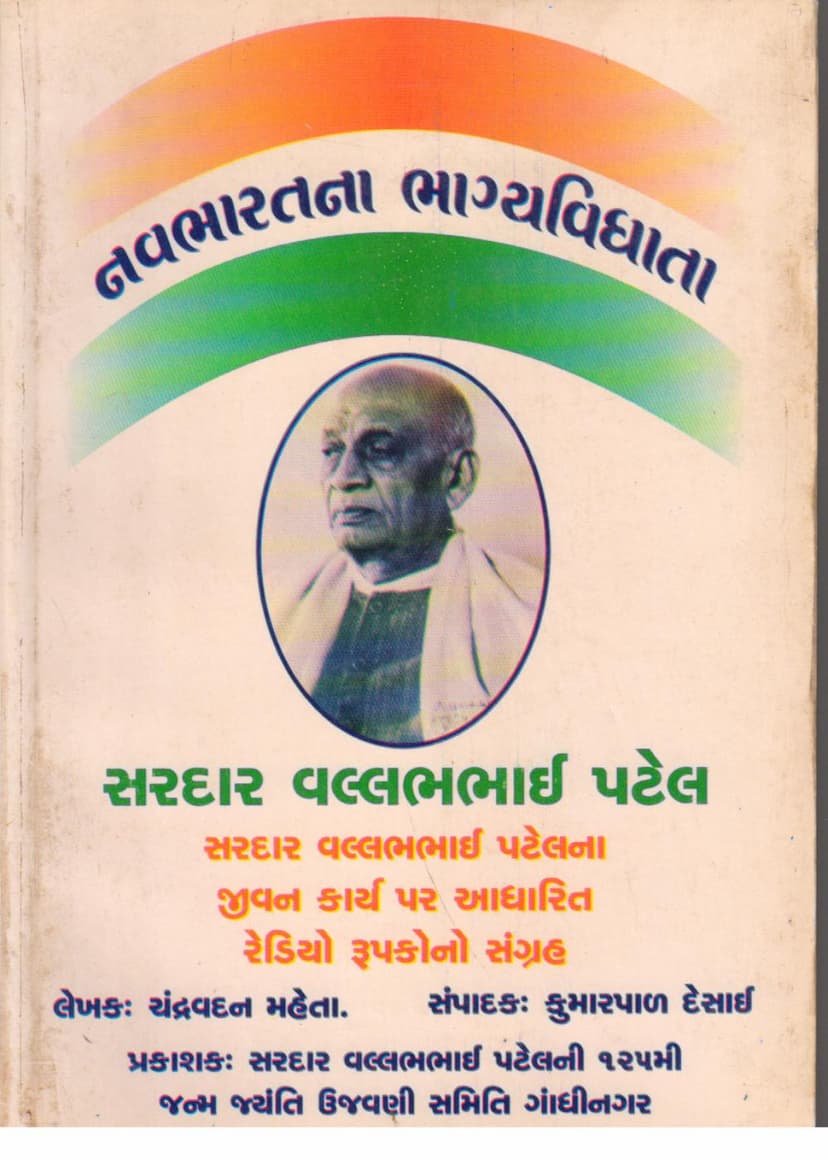Nav Bharatna Bhagya Vidhata Sardar Vallabhbhai Patel
Added to library: September 2, 2025

Summary
This Jain text, titled "Nav Bharatna Bhagya Vidhata Sardar Vallabhbhai Patel" (The Architect of New India, Sardar Vallabhbhai Patel), authored by Chandravadan Mehta and published by the Sardar Vallabhbhai Patel 125th Birth Anniversary Celebration Committee, is a collection of fourteen radio plays (rupaks) that illuminate various facets of Sardar Vallabhbhai Patel's life and work. The book aims to present a comprehensive portrayal of Patel, moving beyond the common perception of him as merely an "iron man" or "Bismarck of India." Instead, it highlights his deeply religious nature, compassionate heart, unwavering faith in God, and his profound sense of duty and sacrifice for the nation.
The collection is edited by Kumarpal Desai, and the first edition was published on December 15, 1975, with a second edition on December 15, 2000.
Key Themes and Content:
The book is structured into twelve plays, each focusing on a specific aspect of Patel's life:
- Early Life and Character: The first play, "Shetranjno Dav" (The Chess Game), depicts Patel's father, Zaverbhai, as a shrewd individual who participated in the 1857 independence struggle. A key episode highlights Zaverbhai's wisdom in suggesting a correct move in a chess game to a ruler, leading to his release from imprisonment. Another play, "Sahanashakti" (Endurance), showcases Patel's incredible patience and concentration, even when enduring a painful procedure like having a boil lanced.
- Peasant Movements: Several plays delve into Patel's leadership in peasant struggles, including the Kheda revenue movement, the Borsad movement, and the Bardoli Satyagraha. These plays emphasize Patel's deep connection with the farmers, his understanding of their plight, and his ability to inspire their courage and resistance against oppressive policies. One excerpt from "Aadaboli – Bharatki Thermopoli" (Bardoli – Thermopylae of India) quotes Patel's powerful statement about the farmer's suffering and his resolve to uplift them.
- Debunking Misconceptions: The author explicitly addresses and refutes the common comparison of Patel with Bismarck, arguing that Bismarck's methods were driven by power and ruthlessness, whereas Patel's strength stemmed from his principles, compassion, and unwavering dedication to the welfare of the people.
- Patel's Compassion and Faith: The plays reveal Patel's deeply ingrained humanism and compassion. His letters and jail notes, as mentioned in the preface, showcase his devotion to religious texts and his profound faith in God. He is portrayed as a person of immense inner strength, empathy for the suffering, and a nurturing, affectionate heart.
- Role in National Integration: Plays like "Hyderabad and..." and "Sarvaiyu ane Vidai" (Summary and Farewell) touch upon Patel's crucial role in the integration of princely states into India, his administrative acumen, and his ability to navigate complex political situations with determination and wisdom.
- Leadership and Vision: The plays illustrate Patel's foresight, his ability to perceive the broader implications of political actions, and his commitment to treating politics as a form of dharma (righteous duty).
- Intellectual and Social Acumen: Plays like "Vidyaabhyas ane Vakilāt" (Education and Advocacy) and "Manisha-piḷiṭī" (Intellectual Prowess) highlight his sharp intellect, his ability to learn and adapt, and his strategic thinking, even in his student days and early legal practice.
The preface, written by Chandravadan Mehta, expresses his gratitude to All India Radio for the opportunity to present these plays and to the Sardar Vallabhbhai Patel Birth Centenary Committee for their publication. He emphasizes that these plays are intended to be staged in schools, allowing younger generations to connect with Patel's legacy.
Kumarpal Desai, in his introductory note, praises Mehta's ability to capture the essence of Patel's multifaceted personality, revealing his deep-rooted values, empathy, and spirit of sacrifice. He highlights the play "Shetranjno Dav" which depicts Zaverbhai's involvement in the 1857 uprising and his release through his intelligence, and the play showcasing Patel's extraordinary tolerance and focus during a painful procedure. The plays effectively illustrate Patel's strength, humility, humanity, and his devotion to the nation, bringing him to life through vivid dialogues and character portrayals.
In essence, this book offers a unique and personal perspective on Sardar Vallabhbhai Patel, not just as a historical figure, but as a deeply principled and compassionate human being who played a pivotal role in shaping modern India. The radio play format allows for an engaging and accessible exploration of his life, making it a valuable resource for understanding his enduring legacy.